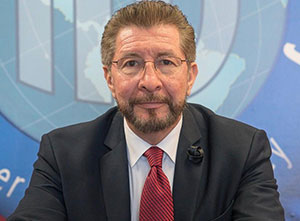Pope Leo XIV is hope for the liberation of the peoples under dictatorships in Cuba, Venezuela, Nicaragua, and Bolivia

By: Carlos Sánchez Berzaín - 11/05/2025
Share:
A notable change for the liberation of the peoples from the Americas has occurred with the arrival of POPE LEO XIV, an American born in the United States who pursued a missionary and pastoral life in Peru, a country whose nationality he assumed. Robert Francis Prevost the American, or the Peruvian “Father Bob,” represents the American cultural crossbreeding that gathers the strengths of the most important democracy of the world and Latin American feelings. His life introduces him as the hopefulness of liberation for the peoples subjected by dictatorships in Cuba, Venezuela, Nicaragua, and Bolivia.
In my essays titled; “Pope Francis and 21st Century Socialism dictatorships” (Infobae, 21 August of 2022), or “Francis, the Pope of 21st Century Socialism dictatorships (Las Americas newspaper, 22 August of 2022) I stated that “the Pope has a triple nature of power, the power of being the Pastor of the Catholic Church, the power of being the Supreme Pontiff of the Catholic Church, and the power of being the Head of Estate of the Vatican. The faith of millions of Catholics makes him their shepherd, their Pastor, the absolute and supreme power over the clergy and faithful make him the Supreme Pontiff, and the fact that he is a reigning monarch makes him the Head of State of the Vatican. The pope deals with politics because he rules on public matters of global reach and, in that context, his relationship, actions or omissions with dictatorships from Cuba, Venezuela, Bolivia, and Nicaragua makes him appear as the Pope of 21st Century Socialism’s dictatorships.”
After remembering some concrete actions of Pope Francis regarding Cuba, Venezuela, Nicaragua, and Bolivia, from his position as the Pastor of the Church, the analyses end up attributing him “Sins of Omission. The lack of protection and total abandonment of his flock and clergy falter his role as Supreme Pontiff and his actions to protect dictatorships falter his investiture as the Head of State of the Vatican.”
On matters of dictators and dictatorships, Pope Francis was remarkably different and even contrary to his predecessor, the canonized saint John Paul II “considered as one of the most influential leaders of the 20th century, especially for being one of the main symbols of anticommunism and for his fight against the expansion of Marxism in places such as Ibero America, where he fought the movement known as Theology of Liberation, and for his decisive role to end communist dictatorships in his native Poland, and finally in all Europe.”
In his first presentation before the College of Cardinals, Pope Leo XIV said “there were many reasons to why take the name Leo, but the main one is because Leo XIII with the historical encyclical Rerum Novarum, dealt with the social questions in the context of the first great industrial revolution” ... and that because the world now lives in a new revolution with Artificial Intelligence, the “contemporary challenges dealing with human dignity, justice, and work, require for the church to offer its patrimony of social doctrine as a response.”
Rerum Novarum from Latin to mean “about new things” was published by Leo XIII on 15 May of 1891 with the title “De Conditione Opificum” (About the Situation of the Laborers). The encyclical in which Leo XIV bases the beginning of his papacy defends laborers expressing “the time was insensibly delivering the laborers -isolated and defenseless- to the inhumanity of the employers and to the frantic greed of competitors,” affirming that “a laborer must not be thought of as a slave; everyone must respect the person’s dignity and nobleness that adds to that person’s his Christian character.”
Regarding socialism, Rerum Novarum says: “Socialists, by pretending to pass private property to the community, aggravate the laborer’s condition because, by removing their right of how they can freely spend their salary, they snatch and take away their hope to improve their economic situation and obtain greater benefits.” It defends private property as a natural right: “Given that man is the only animal endowed with intelligence, we must necessarily grant him the power, of not only to use current things, like other animals, but to own them as well with a stable and perpetual right to do so.” “We find in this same natural law, the basis and the reason of the division of goods and of private property.”
Rerum Novarum attacked and halted the crisis “of decentralization in a period in which the credibility of the church was visibly at a low point in Christianity’s popular sectors and even amongst the clergy.” History shows that “a strategy, designed to help overcome the crisis facing the church was able to save it and the doctrinal restructuration and practices that ensued, structured the new image of the current Catholic church.”
Today, peoples from Cuba, Venezuela, Nicaragua, and Bolivia suffer worse social, economic, and human conditions than those defended by Rerum Novarum. There is poverty and misery, with hundreds of political prisoners and millions forced into exile manipulated as an instrument of Hybrid Warfare against democracies; they endure persecution and torture with State-terrorism. The Cuban regime traffics with physicians and enslaved personnel with the complicity of governments and business owners that pay the dictator; they are narco-States inducing crime to their youth and increasing the internal consumption of drugs... and more; victims of dictatorships have been dehumanized by 21st Century Socialism dictatorships and live in a state of defenselessness.
In those nations subjected by 21st Century Socialism dictatorships “human dignity, justice, and work require for the church to offer its patrimony of social doctrine as a response. The hope of freedom of these nations now appeal to Leo XIV.
*Lawyer & Political Scientist. Director of the Interamerican Institute for Democracy.
Translation from Spanish by Edgar L. Terrazas
«The opinions published herein are the sole responsibility of its author».